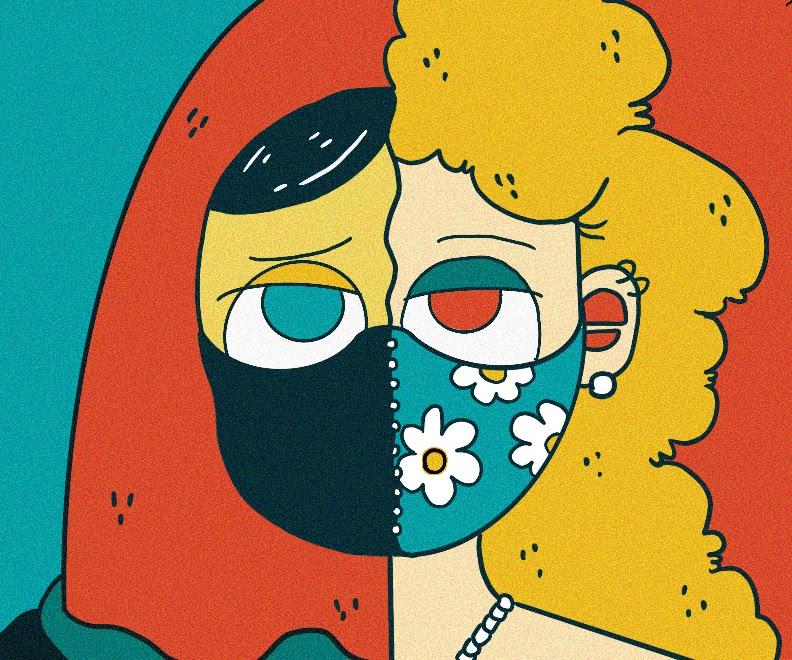
Illustration by Nick Ybarra
Despite face coverings being necessary and essential for public health, they have also recently become the center of the fashion world.
According to a survey conducted by the Pew Research Center in August, 85% of American adults regularly wear a face mask in public.
But recently, high-end fashion brands are capitalizing on the demand for face masks by manufacturing limited edition face coverings, which is a huge problem.
Luxury brands like Louis Vuitton, Dior and Off-White have been producing face coverings that retail for about $100.
But with the long history of Muslim women’s face and head coverings being criticized in Western countries, it’s hypocritical that face masks are now being accepted. If people want to normalize face masks, they should start by normalizing hijabs and other Islamic religious garb.
Head and face coverings in the Islamic religion have been around for thousands of years and Zaina Maryam, a San Jose State nutritional science sophomore who is Muslim, said face coverings are now more socially acceptable because of coronavirus guidelines.
“I think the main issue I have with mainstream fashion is that they are treating head coverings as a simple ‘trend’ by appropriating a part of our religion that has always been hated upon and making it a fashion item,” she said.
Maryam said if the face covering fashion trend focused on supporting Muslim women, then maybe it would be more valid.
Luxury brands are raking in thousands of dollars with face coverings and masks, yet many Muslim women in America said they feel it’s unfair to have an integral aspect of their religion become trendy while they’re often still being harassed.
About 69% of Muslim women who wore a hijab in the U.S. reported at least one incident of discrimination, compared to 29% of women who did not wear a hijab, according to a report from the American Civil Liberties Union.
Hafsa Awil, an SJSU pre-nursing sophomore who is Muslim, said she has been treated negatively while wearing a hijab.
“I just had an incident just a couple days ago where someone outside of my work called me a terrorist,” Awil said. “I’m a visibly Muslim woman with a headscarf so I knew it was directed towards me. I was a bit shocked at first, but I didn’t react because all they want is a reaction.”
Huda Assaf, an event coordinator for SJSU’s Muslim Student Association, said she doesn’t mind if face coverings are being used in high fashion, but she hopes Americans have the same positive energy toward Muslim women wearing headscarves and face coverings.
“It isn’t OK for one to be socially acceptable, while the other is associated with oppression,” Assaf said.
As face masks are becoming fashionable, the concept has simultaneously become politicized.
Muslims have faced increased harassment since 9/11 and now non-Muslims are being commended as selfless and respectable for following basic public health guidelines.
Political leaders who refuse to wear masks seem to promote their personal politics over public health concerns, allowing Americans to defend and legitimize their decision on whether to wear a mask or not.
But for many Muslim women in America, the daily struggle of people making weird faces at them and having to be extra cautious for wearing a piece of clothing in public is still uncomfortable and scary.
Maryam said she doesn’t feel safe being a Muslim woman in the U.S.
“I am always well aware of the fact that hatred for my religion exists and is persistent in this country,” she said. “When I am in public, I tend to be extra aware of my surroundings and very careful around people in fear of being hated upon and even harmed for my beliefs.”
White people who wear face coverings or masks don’t deal with the same situation.
Many Muslim women feel there are misconceptions about their religion because of persistent Islamophobia and harmful rhetoric.
“Many people think that Muslim women are forced to wear a hijab (head scarf), niqab or burqa,” the Anti-Defamination League said in an article. “While it is true that in some countries with significant Muslim populations women are forced to wear the hijab, this is not the reason Muslim women wear the hijab in most cases, particularly in the United States.”
While face masks made to prevent the spread of the coronavirus were not inherently created to appropriate Muslim culture, high-end luxury brands are trying to profit off of items which are necessary to people’s health and have been a source of harassment for Muslim women for decades.